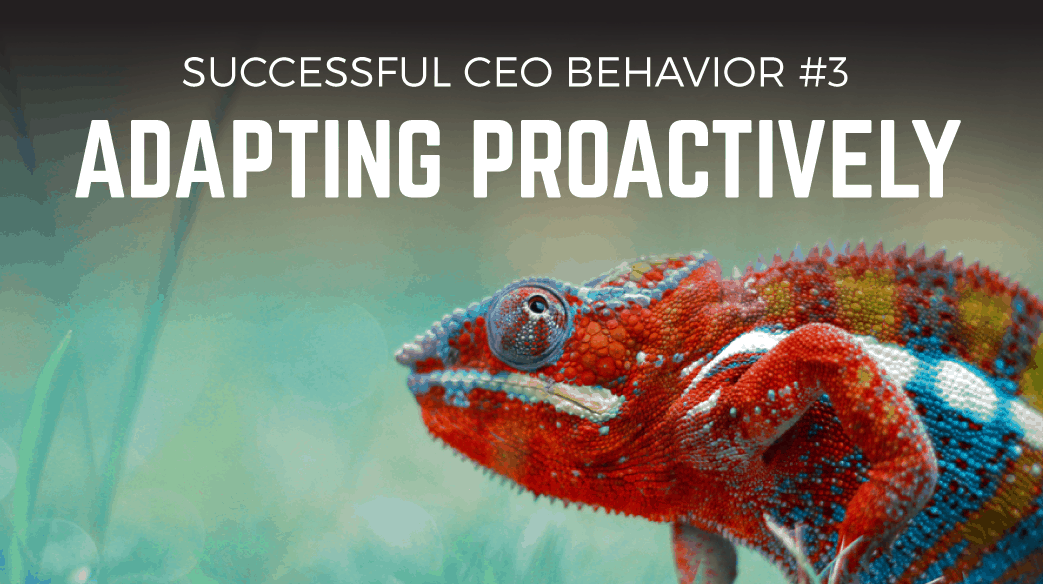Cracking the Successful CEO Code: Part 3 of 4
When faced with setbacks, how do great CEOs rise to the occasion? What skills and strategies do they employ to lead with conviction, keep their teams motivated and, ultimately, plow ahead – even when the road ahead is bumpy? I asked several of Pittsburgh’s top-flight CEOs and found out. The genesis of my questions is a Harvard Business Review article that delves into the four behaviors of stand-out CEOs: 1) Deciding with speed and conviction; 2) Engaging for impact; 3) Adapting proactively and 4) Delivering reliably. To bring these behaviors to life, I’ve been publishing a 4-part blog series, with each post dedicated to a specific behavior. This week, we cover Behavior 3: Adapting Proactively. Insights are shared by Vistage CEOs Chuck Gounaris, Loriann Putzier, and Dave Meyers.
Charles (Chuck) Gounaris: Chair, Vistage International; President, Charles Gounaris & Associates
Q: Chuck, when discussing what makes great CEOs stand out from the pack, the Harvard Business Review (HBR) argues that setbacks can be an opportunity if you leverage them and embrace the art of adapting. Tell us how setbacks and adapting to change can actually be opportunistic, depending on perception and attitude.
A: Occasionally, when we have a setback and things don’t work out the way that we intended, our natural response is sometimes triggered by fear. Fear is really not a friend of a leader in many respects, because it kind of shuts down the ability to be creative and innovative, and really being able to think of alternatives. Yet, in order to move ahead and not let fear override your ability to lead, it’s key to stay focused on the end state that you want to achieve: to make sure that you’re clear about your vision, you can find a why, why is this important to you, beyond making money. We all have a desire to be effective, a desire that’s allowed us to create profitable businesses. But ultimately, our desire drives us beyond profit and helps us achieve our vision.
In the face of setbacks, we must persevere, continue to stay laser focused on that vision and strategy, and plan for growth. If you look at the setback that way, you can be more objective, and be able to figure out what is the learning that you can pick out of it, how do you modify your approach, and keep going at it. I’ve seen many people, who maybe are not successful on the first time – sometimes not even on the second, third, or fourth, or even fifth time – but if they stay at it, and they’ve got purpose and conviction, and meaning behind what they’re trying to do – they’ll get there. You’ve got to believe in yourself.
Loriann Putzier: President and COO, IntegraCare Corporation
Q: Loriann, you’re always one to bravely forge ahead. The HBR article on great CEO leadership discusses viewing setbacks as opportunities. Earlier today, you mentioned the phrase “engaging adaptively.” Please comment further, and give us your take on how engaging adaptively allows us to leverage setbacks.
A: Setbacks are opportunities to reflect. You always want to move forward, but I think for us, knowing where you’ve been is the key to knowing where you’re going. The setbacks, they’re telling you where you’ve been, maybe not always so positive. But, when you’re doing great and then you have a major setback, it causes a regrouping, maybe a study of the numbers, a discussion with multiple groups of team members in the organization to learn something that maybe you’ve lost sight of, or a new trend that you’ve missed, to help you basically build your plan and move forward.
Without those setbacks, sometimes we get a little falsely arrogant, thinking “Gee, we’re doing great, isn’t this great?” I don’t think anybody intends to behave that way, but it’s just what happens to us, naturally. Taking stock of our setbacks keeps us grounded in our roots, using the foundation to then move us forward. They’re useful tools for reflection and progression.
Dave Meyers, President, ALPS Controls, Inc.
Q: Dave, tell me how you define a setback.
A: As an opportunity to learn. And as entrepreneurs and leaders, we define ourselves by the ability to learn from mistakes and bad decisions. We just bounce back and go, “Well, I’ll do this instead.” We don’t suffer over it and say, “Oh, my gosh, how stupid could I have been, that was a terrible decision.” No. We quickly analyze it, after we’ve made the decision, and say, “That was dumb,” and then we just jump back and do something different. We just dust ourselves off. Other people cannot dust themselves off, because the dust is so thick, they’re so upset. We don’t do that. We think we’re always right and when we’re wrong, we were still right – to take a chance, to lead, and to move ahead.
+++
There you have it, folks. Come back next week when I’ll share my final installment from this blog series, and wrap with insights from Vistage CEOs on the need to deliver reliably.


